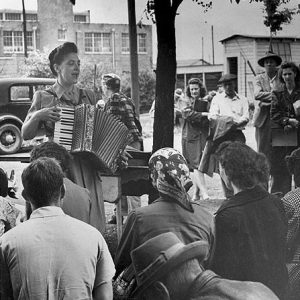calsfoundation@cals.org
Zilphia Mae Johnson Horton (1910–1956)
Zilphia Mae Johnson Horton was an influential educator, folklorist, musician, and social justice activist who collected, adapted, performed, and promoted the use of folksongs and hymns in the labor and civil rights movements, notably “We Shall Not Be Moved” and “We Shall Overcome.” These two, respectively, became labor and civil rights movement anthems. She served as the first cultural director of the Highlander Folk School in Tennessee—the precursor of today’s Highlander Research and Education Center, founded by her husband Myles Horton—until her untimely death in 1956.
Zilphia Johnson was born in Paris (Logan County) on April 14, 1910, the second child of Robert Guy Johnson, a coal mine superintendent, and Ora Ermon Howard Johnson, a schoolteacher. She was the eldest of four daughters.
Paris was a prosperous and growing community with a population of approximately 1,500 in 1910. The city’s prosperity was based on coal mining, which was concentrated in a narrow band of coal fields located along the Arkansas River Valley. Johnson’s father worked for the Paris Purity Coal Company. His ample income provided the family with an affluent lifestyle, including private music lessons for Zilphia, who began studying piano at age five and became an accomplished classical musician.
Johnson attended the College of the Ozarks (later the University of the Ozarks) in Clarksville (Johnson County), where she studied drama and music. She graduated in 1931.
In 1930, the Reverend Claude Williams became pastor of Paris’s Cumberland Presbyterian church, which Johnson attended. Williams’s ministry stressed solidarity with victims of social injustice, which appealed to working-class parishioners and young people such as Johnson and future folk singer Lee Hays, who regarded both Williams and Johnson as mentors. Despite the church’s significant growth during his tenure, Williams’s political and social views provoked community elites and congregational elders who, in 1935, ousted him from the pulpit.
Like Hays, Johnson was greatly influenced by Williams in ways that would help to chart the course of her life. In 1934, she joined him in an effort to unionize her father’s coal mine. Myles Horton summarizes a pivotal episode from this period: “[Zilphia] got mixed up with Claude Williams….Claude was trying to organize the workers in Guy Johnson’s mine for the Progressive Miners’ Union….Zilphia got involved in this attempt to organize her dad’s mine. Her father told her she had to stop going to Claude Williams’s church, and if she didn’t, he was going to throw her out of the house. She just ignored him, he disowned her, and some friends of mine sent her to Highlander.”
Soon after she arrived at Highlander Folk School in early 1935, she and Myles Horton were married. Not long afterward, Myles mediated a partial reconciliation between his wife and father-in-law. The couple lived modestly at Highlander for many years and worked for the causes to which they had committed themselves. They had two children.
As Highlander’s cultural director, Zilphia Horton pioneered the mobilization of folk culture resources, especially music, in the service of social justice causes. Her multifaceted work spanned a wide range of expressive arts, all of which aimed at educating and empowering oppressed people. Pete Seeger recalled the talent and temperament she brought to this work, andLee Hays credited her with motivating him to become a folk singer.
Best known of Horton’s many accomplishments, and illustrative of her work with many other songs, is her role in making an old hymn into the iconic anthem of the 1950s and 1960s civil rights movement, “We Shall Overcome.” In October 1945, she learned the version sung on the picket line during a tobacco workers’ strike in Charleston, South Carolina, by Lucille Simmons, who had changed the words “I’ll overcome” to “We will overcome.” It soon became Horton’s favorite song. She added verses to the song, such as “We’ll walk hand in hand,” and changed the tempo. Later, she taught it to Pete Seeger, who changed “We will” to “We shall” to make it easier to sing. Over a period of years, in large measure through Horton’s influence, the protest song spread throughout the labor and civil rights movements, and beyond, eventually becoming an international anthem of social justice movements. Civil rights leader Julian Bond observed, “People tell me that you can go anywhere in the world today and there’s somebody singing this song.” In September 2017, a federal judge ruled that the song would no longer be under copyright control (Seeger, Horton, Frank Hamilton, and Guy Carawan had obtained the copyright in the 1960s) and instead should be in the public domain.
Horton died in Nashville, Tennessee, on April 11, 1956, just before her forty-sixth birthday from acute kidney failure from uremic poisoning following accidental ingestion of a typewriter cleaning solution.
For additional information:
Adams, Frank. Unearthing Seeds of Fire: The Idea of Highlander. Winston-Salem, NC: John F. Blair, 1975.
Austin, Aleine. “Zilphia.” Social Policy 21 (Winter 1991): 49–52.
Brown, Jim, director. We Shall Overcome: A Stirring Tribute to This International Civil Rights Anthem. VHS. Arlington, VA: PBS Home Video, 1990.
Hodge, Chelsea. “The Coal Operator’s Daughter: Zilphia Horton, Folk Music, and Labor Activism.” Arkansas Historical Quarterly 76 (Winter 2017): 291–307.
Horton, Myles. The Long Haul: An Autobiography. New York: Teachers College Press, 1989.
Preskill, Stephen. Education in Black and White: Myles Horton and the Highlander Center’s Vision for Social Justice. Berkeley: University of California Press, 2021.
Ruehl, Kim. A Singing Army: Zilphia Horton and the Highlander Folk School. Austin: University of Texas Press, 2021.
Schneider, Stephen A. You Can’t Padlock an Idea: Rhetorical Education at the Highlander Folk School, 1932–1961. Charleston: University of South Carolina Press, 2014.
Zilphia Horton Folk Music Collection. Manuscript Section. Tennessee State Library and Archives, Nashville, Tennessee.
Greg A. Phelps
Lindsey Wilson College
 Zilphia Horton
Zilphia Horton 




Comments
No comments on this entry yet.